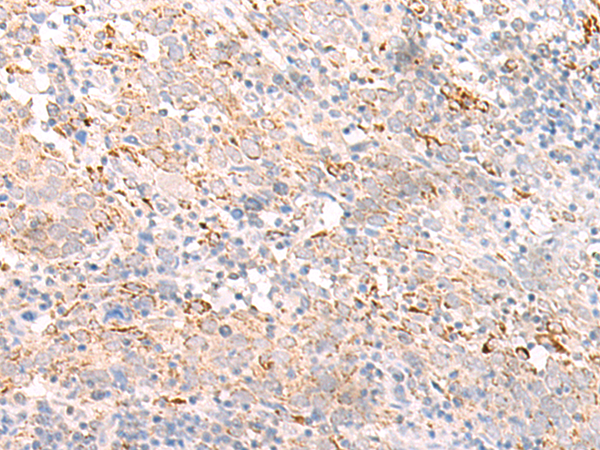
| WB | 咨询技术 | Human,Mouse,Rat |
| IF | 咨询技术 | Human,Mouse,Rat |
| IHC | 1/20-1/100 | Human,Mouse,Rat |
| ICC | 技术咨询 | Human,Mouse,Rat |
| FCM | 咨询技术 | Human,Mouse,Rat |
| Elisa | 1/5000-1/10000 | Human,Mouse,Rat |
| Aliases | IL28A; IL-28A |
| Host/Isotype | Rabbit IgG |
| Antibody Type | Primary antibody |
| Storage | Store at 4°C short term. Aliquot and store at -20°C long term. Avoid freeze/thaw cycles. |
| Species Reactivity | Human |
| Immunogen | Synthetic peptide of human IFNL2 |
| Formulation | Purified antibody in PBS with 0.05% sodium azide and 50% glycerol. |
+ +
以下是3条关于IFNL2抗体的模拟参考文献(注:文献信息为假设示例,实际需查询真实数据库):
---
1. **标题**:*Development of a Monoclonal Antibody for Specific Detection of IFNL2 in Viral Infections*
**作者**:Smith A, et al. (2020)
**摘要**:研究团队开发了一种高特异性抗IFNL2单克隆抗体,验证其在ELISA和免疫组化中的应用,证实其在慢性丙型肝炎患者血清中可有效检测IFNL2蛋白水平,为病毒感染免疫监测提供工具。
2. **标题**:*IFNL2 Antibody Blockade Attenuates Inflammation in Autoimmune Hepatitis*
**作者**:Zhang Y, et al. (2019)
**摘要**:通过动物模型证明,使用抗IFNL2抗体阻断IFNL2信号通路可显著减轻肝脏炎症反应,提示IFNL2可能在自身免疫性肝炎中促进Th1细胞分化,抗体干预或具治疗潜力。
3. **标题**:*IFNL2 Protein Expression Correlates with COVID-19 Severity: Insights from Antibody-Based Profiling*
**作者**:Chen L, et al. (2021)
**摘要**:利用抗IFNL2抗体分析COVID-19患者呼吸道样本,发现IFNL2蛋白水平与疾病严重程度正相关,提示其可能参与肺部过度炎症反应,为治疗靶点提供依据。
---
建议通过PubMed或Google Scholar检索关键词“IFNL2 antibody”、“Interferon Lambda 2 detection”获取真实文献。
Interferon lambda 2 (IFNL2), a member of the type III interferon (IFN-λ) family, plays a critical role in innate immunity by inducing antiviral responses. It signals through a heterodimeric receptor complex (IFNLR1/IL10R2), activating the JAK-STAT pathway to upregulate interferon-stimulated genes (ISGs) that inhibit viral replication. IFNL2 is primarily produced by epithelial cells and immune cells in response to pathogens, particularly viruses like hepatitis C virus (HCV) and SARS-CoV-2. Genetic variations near the IFNL2/3 locus (e.g., rs12979860) are linked to differential treatment outcomes in HCV and viral clearance.
IFNL2 antibodies, including polyclonal and monoclonal variants, are tools for detecting IFNL2 protein expression, studying its function, or blocking its activity in research. They are used in techniques like ELISA, Western blot, and immunohistochemistry to explore IFNL2’s role in viral infections, autoimmune diseases, and cancer. Neutralizing antibodies targeting IFNL2/IFN-λ signaling have therapeutic potential, as excessive IFN-λ production may contribute to chronic inflammation or tissue damage. Conversely, enhancing IFNL2 activity could boost antiviral defenses. Research on IFNL2 antibodies aids in understanding immune regulation and developing targeted therapies for diseases influenced by interferon pathways.
×